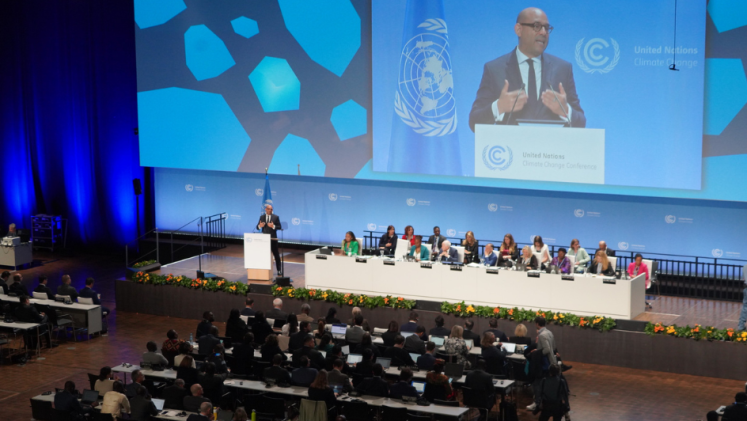The road to Baku makes its stop in Bonn for the next two weeks as the city hosts the annual Bonn Climate Change Conference. While this conference doesn’t quite grab the attention that the Conference of the Parties (COP) does, it is an important milestone. Here, the technical work, committee meetings, key discussions and agenda setting for COP29 take place. Given momentum provided by the historic COP28 commitment to transition away from fossil fuels, there is plenty of work to be done over the course of the conference.
Here are 5 things to expect at the Bonn Climate Change Conference 2024:
Ending one cycle of NDCs and preparing for another
An entire decade of Nationally Determined Contributions (NDCs), encompassing two rounds of five-year contributions, will soon end. The third cycle will begin in 2025 and the Paris Agreement requires that parties ratchet up their ambition with each new cycle. However, the first Global Stocktake at COP28 concluded that — despite progress on mitigation, adaptation and means of implementation and support — parties are not on track to achieve the goals in the Paris Agreement. The conference will specify what the conclusions of the Global Stocktake concretely mean for the next NDCs. Country representatives also must address elements of transparency and reporting, as well as prepare to resolve the outstanding issues on carbon markets and voluntarily cooperation mechanisms.
Priming the new climate finance target
In 2015, negotiators agreed to set a "new collective quantified goal on climate finance" (NCQG) to replace the existing goal. The NCQG is meant to be adopted this year at COP29 in Azerbaijan, with tough questions to answer around quantity and quality of necessary climate finance. The new goal should work from the previous target to mobilize 100 billion USD from wealthy nations for climate action in developing nations. Discussions in Bonn will also cover past experiences – for instance how the original target was only achieved in 2022, two years past its deadline, and who should contribute. Meaningful climate finance is important to ensure strengthened NDCs past 2025.
Zooming in on climate change impacts on children and mountains
The Bonn Climate Change Conference also covers a new set of mandated events. For the first time Expert Dialogues are taking place on the topics of climate change and children and mountains. An Expert Dialogue on children and climate change will assess the specific challenges children face due to climate change including food security and disruptions to education. The discussions will cover possible policy options. Similarly, over two days, parties are looking at climate and mountains, highlighting climate impacts in sensitive areas and discussing options to accelerate climate action to aid mountainous regions.
Renewed focus on the Global Goal on Adaptation (GGA)
The GGA is designed to ensure an adequate adaptation response to protect people, livelihoods and ecosystems as the world aims to limit the temperature increase to 1.5°C above pre-industrial levels. In Bonn, emphasis will be placed on the establishment of a new work programme on indicators for measuring progress on the GGA. At COP28, countries agreed on the goal’s overarching framework including global adaptation goals. However, ways to mobilize finance as well as concrete targets are lacking. For the most vulnerable to benefit from the GGA, negotiators need to resolve these current shortcomings.
Wrapping up the Glasgow Dialogues and scaling up loss and damage action
The third and final Glasgow Dialogue (GD3) will take place and focus on enhancing coordination, progress and scaling up funding arrangements. The dialogues are organized in cooperation with the Warsaw International Mechanism (WIM), on which movement is also expected. Parties are set to develop the terms of reference (ToR) for its 2024 review. This review should integrate reports from COP26, COP27, COP28 and the first meeting of the Santiago Network Advisory Board into a comprehensive decision. It is seen as a key opportunity to strengthen the WIM, improve coordination for the newly created Loss and Damage Fund and funding arrangement, as well as to scale up financial support within the evolving framework of loss and damage governance.





